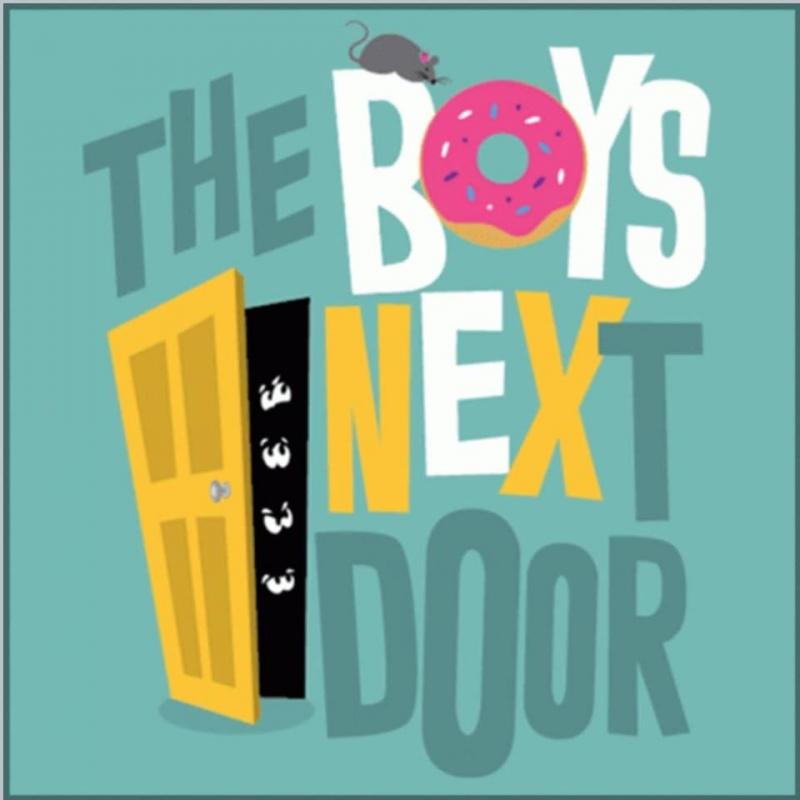Review: THE BOYS NEXT DOOR at Bridge Players Theatre Company is Emotional, Heart-Warming and Hilarious

What do Wheaties, doughnuts, golf, and a library card have in common? Not much, except that each of these items is extremely important to one of the four main characters in Tom Griffin's play The Boys Next Door.
In a communal residence in a New England city, four men with disabilities live under the supervision of an earnest, but increasingly "burned out" young social worker named Jack Palmer (Thomas Everett): Norman Bulansky (Matthew Brent) works in a doughnut shop and is unable to resist the lure of the sweet pastries, and he takes great pride in the huge bundle of keys that dangles from his waist; Lucien P. Smith (Jay Scott Burton) has the mind of a five-year-old but imagines that he is able to read and comprehend the weighty books he lugs about; Arnold Wiggins (Stephen Jackson), the ringleader of the group, is a hyperactive, compulsive chatterer, who suffers from deep-seated insecurities and a persecution complex; while Barry Klemper (Jeff Skomsky), a brilliant schizophrenic who is devastated by the unfeeling rejection of his brutal father, fantasizes that he is a golf pro.
The Boys Next Door is a series of vignettes blending scenes from the residents' daily lives (where "little things" sometimes become both momentous and comic) with moments of great poignancy, reminding us that those with disabilities are like everyone else, wanting only to love, laugh and find some meaning and purpose in life.
Bridge Players Theatre Company is producing Tom Griffin's The Boys Next Door, directed by Edwin Howard, as a part of their 43rd season: A Season of Dreams.
The Boys Next Door is heart-warming and funny play from the late 1980's with a popular TV movie from 1996.
Recognizable 80's music plays as you enter Bridge Players performance space behind the Broad Street United Method Church Sanctuary. Simple Mind's iconic "Don't You Forget About Me" appropriately sets the tone for this heart-warming story about men who are afraid that they are going to be forgotten both by the world as well as by their caregiver Jack who has gotten a new job and is leaving his position caring for the men.
Stephen Jackson as Arnold Wiggins, Matthew Brent as Norman Bulansky, Jay Scott Burton as Lucien P. Smith, Jeff Skomsky as Barry Klemper, and Thomas Everett Jack Palmer have great chemistry onstage. They listen to each other and play off of each other well, having lots of energy that helps keep the play exciting and also makes the show have nice pacing.
Rounding out the cast are Lisa Croce as Sheila, Russ Walsh as Mr. Klepmer, Andrea Veneziano as Mrs. Fremus/Mrs. Warren/Clara/Senator Clarke, and Timothy Kirk as Mr. Hedges/Mr. Corbin.
Griffin's script balances drama and comedy well, never making the disabled characters caricatures. Though the things that the characters say and do in the show carry humor, the show never makes fun of the mentally handicapped. You can't help but laugh at the antics of the group, especially when Norman, Lucien, and Arnold are chasing what they believe to be a rat around their apartment in the middle of the night.
Perhaps the most impressive aspect of Bridge Players' production is the actors themselves. Jackson, Brent, Burton, and Skomsky are convincing in their roles and committed to their characters, never making a mockery of the mentally disabled. Their earnest portrayal is gut-wrenching and sitting in the audience, I easily found myself investing in their stories.
Griffin's play crafts a story arc for each of the characters. They all experience a transformation in the play.
Besides being very comedic, The Boys Next Door delves into the logistical difficulties of having a mental disability and of living in a group home. Norman desperately wants to bring a girl Sheila to the apartment to spend alone time with her (which is not typically permitted), and Arnold, Lucien and Norman have a difficult time getting Barry to do his chores.
Griffin's script is also gut-wrenching at times depicting the disabled men's struggles. One of my favorite moments in the play is the scene between Barry (played by Skomsky) and his father (played by Russ Walsh). Barry sits frozen on the couch as his brutal one-armed father paces about the apartment. When he tears down Barry's "Welcome Home Dad" sign, it becomes clear that there is a huge disconnect between the two. The scene is very emotional. Barry's father in frustration lashes out at Barry, making him break down, and it is evident how harmful Barry's father is to his mental health.
Similarly, Arnold, who works as a janitor at a movie theatre, is abused and mistreated by his co-workers. He is made to perform menial tasks for them and though he is upset, he cannot find the courage to stand up for himself.
Another heart-breaking moment is when Jay Scott Burton as Lucien breaks the fourth wall, and talks directly to the audience in a "normal" manner (as if he never had any intellectual disability) about his reality of having the comprehensive knowledge of a five year old. Lucien has to attend a hearing because the state believes that he might be faking his condition. Lucien doesn't understand, and while in the hearing his monologue breaks the scene. He steps out of his chair and talks directly to the audience reminding them that he exists to make the intellectually more able be more grateful for their circumstances.
Perhaps the saddest of all is how the men react to their caregiver, Jack, leaving them. The boys try to throw him a "going-away party", but it ends in upset and tears.
The Boys Next Door is an appropriate play for Bridge Players to include in their Season of Dreams. The main characters of Griffin's play all have distinct dreams that may seem ordinary, but to these handicapped men are possibly far-off goals. Norman dreams of having a future with Sheila, having kids and bringing them everywhere they go. Arnold dreams of going to Russia. Lucien, holding so much importance in his library card, dreams of being able to read and function like everyone else. And Barry dreams of being a golf pro and of having a "normal" relationship with his dad.
Bridge Players is dedicated to diversity, depicting diversity on the stage as well as reaching out to the diverse community in South Jersey. In an effort to make this show accessible to all types of audience members, the performance on Feb. 9th with be sign-interpreted, and Assistive Listening Devices will be available Feb. 8-10th.
The Boys Next Door plays now through February 16th at Broad Street United Methodist Church on E Broad Street in Burlington, NJ.
For more information about the show and to purchase tickets, please visit bridgeplayerstheatre.com

Reader Reviews

Videos

